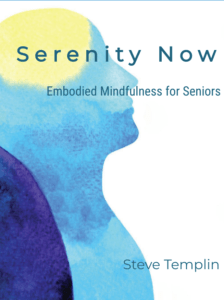Have you noticed how a mind can be a terrible thing? A busy mind can torment us in many ways, negatively influencing both our psyche and body. The mind is busy, often negative … worrying or obsessing, and the body is tense.
Many of us are so hypnotized by our minds that we don’t see an alternative to endless ‘thinking’. This state can lead to less than desirable behaviors and addictions that often serve as temporary, superficial attempts at relief from the anxious mind and tense body.
Connecting with the Body Quiets the Mind
‘Focusing’ research that was done at the University of Chicago in the 1960’s showed that ‘thinking’ became more orderly and creative as attention was gently focused on sensations in the body.
Further research in the field of neurofeedback showed that when we notice bodily sensations as ‘space’, as in ‘notice the space that your right hand occupies’, we enhance the orderliness of brain waves, which positively influences brain function, and how we think and feel.
Noticing the Energy in Your Body
I find that noticing sensations as patterns of energy is even more balancing than noticing either ‘space’ or ‘sensations’ alone. In Chinese Medicine we talk about Qi and it’s often thought of as some mysterious energy. The truth is, we all experience Qi. Sensations and feelings are simply the subjective experience of Qi.
The challenge for most of us is that we’ve learned to identify with our thinking mind and to avoid or ignore the feeling life of the body. This habit of thinking keeps us disconnected, stressed, and less resourceful emotionally and physically.
An alternative to a runaway, thinking mind is a connection with the energy of your body. Gently noticing your body’s energy (sensations) and breathing slowly and gently organizes your nervous system and brings greater peace and order to your mind, along with greater ease and health to your body.
When in doubt, notice the energy that you feel and breathe slowly. Appreciate any change for the better. The more you practice the sooner you will notice benefits.
Here’s a quick review of some of the benefits:
- Better oxygenation of the brain and body tissues (breathing gently and slow releases more O2) reduces anxiety and quiets the mind.
- Dilation of blood vessels = more blood and O2 to tissues.
- Breathing passages open more and congest less (sinuses and bronchioles).
- Restoring balance to the autonomic nervous system (ANS).
- Moving from the stress related limbic brain to the prefrontal lobes where we’re more resilient, creative, and resourceful.
- Balancing the ANS reduces inflammation and increases detoxification.
You can practice this noticing, accompanied by a single slow breath, dozens of times daily.
The benefits are cumulative.
 Steven Templin, D.O.M., Dipl. Ac. specializes in Acupuncture and Limbic Brain Reprogramming to address the roots of chronic pain and illness. He offers a comprehensive mind-body program for addressing the underlying inflammation, toxicities, and stress-induced causes of most pain and illness.
Steven Templin, D.O.M., Dipl. Ac. specializes in Acupuncture and Limbic Brain Reprogramming to address the roots of chronic pain and illness. He offers a comprehensive mind-body program for addressing the underlying inflammation, toxicities, and stress-induced causes of most pain and illness.
He places special emphasis on resolving the stress response and repairing adrenal gland and digestive system function to address the root causes of many common and often difficult to treat illnesses.
He translates emerging research in the fields of Epigenetics, Energy Psychology, and Functional Nutrition into effective practices that you can perform at home.
You can work with Dr. Templin in his Lakeland office, or online. You can visit his website at www.stevetemplin.com and contact him via email at drtemplin@gmail.com.
You can schedule an office visit with Dr. Templin by calling 863-838-2779.

 Steve is a retired Doctor of Oriental Medicine, Acupuncture Physician, and HeartMath Trauma-Sensitive Certified Practitioner with over 35 years of clinical experience in the fields of Energy Medicine, Energy Psychology, and Biofeedback.
Steve is a retired Doctor of Oriental Medicine, Acupuncture Physician, and HeartMath Trauma-Sensitive Certified Practitioner with over 35 years of clinical experience in the fields of Energy Medicine, Energy Psychology, and Biofeedback. 